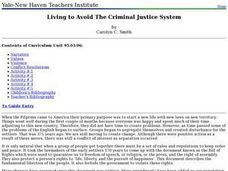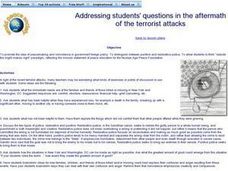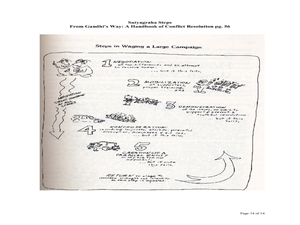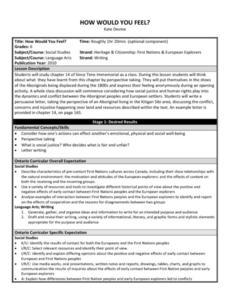Teaching Tolerance
Using Photographs to Teach Social Justice | Confronting Unjust Laws
The right to peacefully assembly to protest injustice is a key element of the First Amendment to the United States Constitution. Class members are asked to analyze two photographs of people confronting what they consider to be unjust...
US Institute of Peace
Organizations Working for Peace
We're all in this together! Show young scholars that peace is a process and having the support of like-minded people can make it happen. 13th in a series of 15 peace building activities, groups conduct research on a peace organization,...
PBS
Martin Luther King Jr.: Civil Rights Leader
Expand class members' appreciation of the work of Dr. Martin Luther King, Jr. A powerful resource examines King's speeches, writings, and actions that reveal his deep commitment to a nonviolent approach to Civil Rights. Learners watch a...
Museum of Tolerance
Creating an Ideal World
To conclude a study of social justice and tolerance designed to prepare classes for a visit to the Museum of Tolerance, class members brainstorm a safe and peaceful world. They then write about their own vision of this world.
PBS
“He Named Me Malala”: Understanding Student Activism Through Film
Malala Yousafzai has become the face of social activism. After watching He Named Me Malala and short student-made films about what young people can do to become instruments of change, class members reflect on what it means to be an...
Curated OER
Conflict Resolution Lesson Plan
Fourth graders investigate conflict and social justice. In this conflict resolution instructional activity, 4th graders consider conflicts they have experienced and think about how they could have applied conflict resolution strategies...
Curated OER
Freedom Fighters
Students discover the accomplishments of Nelson Mandela and Martin Luther King, Jr. In this social justice instructional activity, students watch "Freedom Fighters," and then read speeches or writings made by each of the men. Students...
Stanford University
Beyond Vietnam
On April 4, 1967 Martin Luther King, Jr. delivered his speech "Beyond Vietnam." The controversy that followed is the focus of a three-instructional activity unit that asks class members to consider the political and social implications...
Curated OER
Budgeting for Peace
Students explore world leader's quests for peace. In this world leader research lesson, students read a speech by Archbishop Desmond Tutu and view budget figures for the United States. Students work in groups to create an alternate...
Curated OER
Friendship
Students investigate the concept of friendship as part of a four lessons unit which integrates literature with language arts, family life, social studies, or religious studies. Peace, cooperation, social justice, and multicultural...
Curated OER
Restorative Justice
Sixth graders study restorative justice. In this government activity, 6th graders discuss restorative justice, examine the ways restitution can be made when a crime occurs, and write about a conflict at home or school and describe how it...
Developing a Global Perspective for Educators
Imagine Being Me
The design of this two-day lesson eloquently exposes learners to the topic of social justice for people with disabilities. The plan is built off the reading of Are You Alone on Purpose? by Nancy Werlin. The activity introduces...
Curated OER
Our Global Community
First graders experience literature which shows how communities live around the world. In this global community lesson, 1st graders read books such as Whoever You Are, by Mem Fox and create a work of art based on their feelings about the...
Learning to Live
Attributes of a Civil Society
What makes a society civil? High school freshmen search for examples of justice, kindness, peace, and tolerance in news media and brainstorm how they can promote these attributes in their schools, communities, and world. The well-rounded...
Curated OER
The Media and Social Justice in the United States
Students have group discussions that allow the teacher to assess the level of comprehension of the ideas of subjectivity and objectivity. Level of discussion at the end of the class provides some indication of comprehension as well....
Curated OER
Living to Avoid The Criminal Justice System
Students brainstorm a list of negative stereotypes in the African-American society. In groups, they develop ways to decrease the chance of them living in poverty and being in trouble with the law. They develop ways to solve problems...
Curated OER
Social Responsibility Need - Versus - Greed
Students look at situations where people's rights have been infringed. They stimulate thought and action regarding use of our resources and respecting diversity. They respect those who have different beliefs/customs and appreciate...
Curated OER
Addressing Student's Questions in the Aftermath of the Terrorist Attacks
Students discuss peacemaking. In this political policy and emotions instructional activity, students explore ideas for expressing feelings in the aftermath of September 11, 2001. Students reflect on punitive and restorative justice.
Curated OER
Gandhi's Non-violent Revolutions: Examining Tools to Make Non-violent
Students analyze Gandhi's philosophy of nonviolent social change. In this nonviolence and social change lesson, students research a leader from the attached list who practiced nonviolent social change. Students write their own poem...
Curated OER
Sharing is Caring
By engaging in an arts-based activity, 2nd graders explore peace in the classroom. They listen to the story The Rainbow Fish, then create their own fish to hang in the classroom. They write three things that make them happy on...
Curated OER
In the Struggle for Equality and Justice for All
Students focus on the struggle for minorities rights. They describe the civil rights movement of the late 1950's and the 1960's. They trace the roots of the movement in the second-class treatment accorded many black Americans and...
Stanford University
Observing Human Rights Day
How much intervention is appropriate for America to take in cases of human rights violations? Class members ponder a question that has lingered since the birth of America with a series of primary sources that reflect the degree to which...
Curated OER
How Would You Feel?
Sixth graders put themselves in the shoes of aborigines who were displaced from their homes in the 1800s by Europeans who came in and took their land from them. They discuss the social injustices suffered by these people, and write...
Curated OER
Mock Trial
Students rewrite a traditional fairy tale to represent the viewpoint of the villain. They participate in a mock trial of that villain in which all regular court participants (judge, jury, defendant, witnesses, plaintiff, etc) play roles.

























